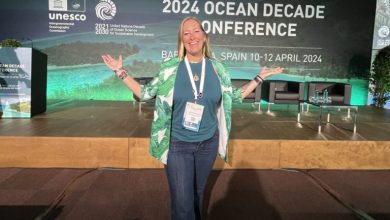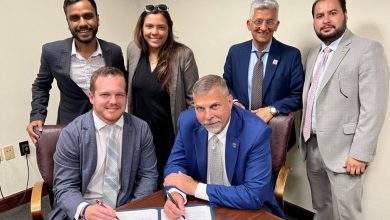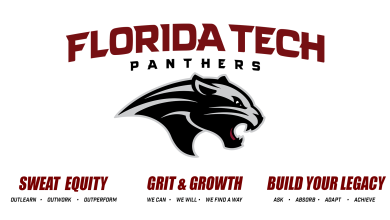University, Community Partner for A Day in the Life of the Indian River Lagoon
Florida Tech is once again teaming up with the Ocean Research and Conservation Association (ORCA) to bring attention to the Indian River Lagoon – and to bring science to young learners.
On Thursday, university students and teachers, joined by over 30 primary schools and 28 environmental organizations, participate in ORCA’s 6th Annual A Day in the Life of the Indian River Lagoon. This community-based, citizen science and experiential research program allows students, teachers and environmental partners to collaborate in gathering water quality data and biological inventories at over 40 locations in six counties along the 156-mile estuary.
Florida Tech is teaming with Central Middle School to examine the oyster mats at Ryckman Park in Melbourne Beach, part of the university’s Living Docks program. Robert Weaver, ocean engineering and marine sciences associate professor and director of the university’s Indian River Lagoon Research Institute, is leading Florida Tech’s participation of the event.
Faculty and student researchers will get data on various aspects of the lagoon, such as chemical analysis that will measure the water’s temperature, salinity and turbidity (how cloudy or hazy the water is). Researchers will also examine phosphates and nitrates in the water: high levels of the two have been partially responsible for overfertilization of the water, leading to harmful algal blooms. They will also conduct a fish census of sorts, recording the species, size and numbers of fish collected.
The data will be used for research in Florida Tech classrooms and labs.
Like an annual checkup, A Day in the Life is a way for researchers to annually check the health of the lagoon while incorporating the community in the process.
“We see a lot of students that don’t get out there as much to nature or their ecosystem, so this is a way to do that,” Weaver said. “It’s a large group of kids and they have a blast out there. It’s great to see them out there and experiencing new things.”
The Living Docks program is in its tenth year and over that decade, Florida Tech has installed approximately 1,000 oyster mats around various docks in Brevard County to promote the growth of oysters and other filter-feeding organisms to help clean the lagoon. The team has gone back to study the mats, and this event is another opportunity to do so and analyze their effectiveness while also introducing this concept of restoration to university and middle school students. The program has also led to former students to take action: Morgan Gilligan, who received her master’s in biological oceanography, implemented a Living Docks program in Stuart, Florida.
“In a lot of places, we’re seeing oyster growth, and what you see growing on the living dock mats is very different than what you would see on a sterile, normal dock piling, so we know they’re making a difference with regards to the growth,” said Kelli Hunsucker, ocean engineering and marine sciences assistant professor. “We started to look at some of the impacts based on filtration, and that’s promising.”
Weaver said this event would be “impossible” for them to accomplish without the participation of graduate and undergraduate students at Florida Tech, who have been able to pass on what they’ve learned in the classroom to the younger generation.
“I think every time you put someone in position where they get to showcase their knowledge and skills, especially in front of someone who is completely new to a topic, there’s a bit of pride that goes in there as they’re teaching the bits of knowledge that they’ve learned,” Weaver said.





